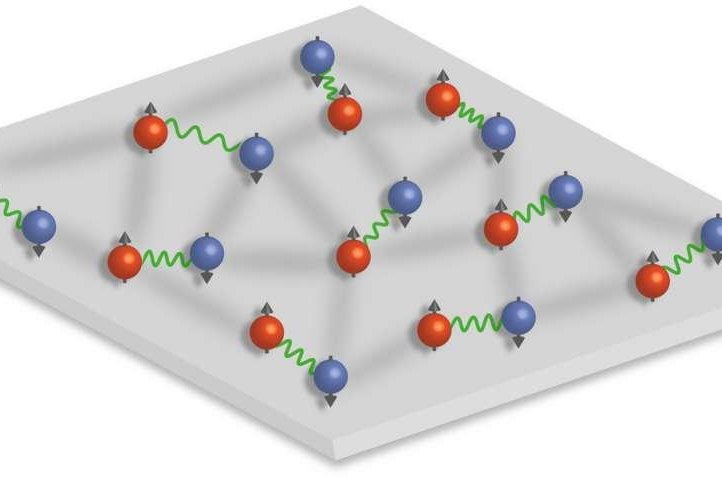The green lines represent the unique pairing behavior exhibited by fermions in a 2D medium. Photo by Puneet Murthy/Heidelberg University
Dec. 22 (UPI) -- Scientists in Germany have observed evidence of a new and exotic matter state. The discovery could offer insights into the phenomena of superconductivity.
When scientists confined ultracold atoms to a 2D medium, scientists witnessed a unique type of particle pairing. They described the unusual interactions between the particles, called fermions, in a new paper published this week in the journal Science.
Physicists at Heidelberg University discovered the new matter state while investigating superconductivity.
When superconductive mediums are cooled to a certain critical temperature, electrons can flow freely, without resistance. Scientists are particularly interested in a new class of superconductors with extremely high temperature thresholds, allowing them to host high-speed electron flows without extreme cooling.
Physicists believe fermion pairing plays an important role in allowing high-temperature superconductivity. Imaging of the unique class of high-temperature superconductors has also revealed layered nano-structures within.
"This means that electrons in these systems can only move in two-dimensional planes," Selim Jochim, a professor and researcher at Heidelberg's Institute for Physics, said in a news release. "What we did not understand until now was how the interplay of pairing and dimensionality can lead to higher critical temperatures."
To better understand these unusual dynamics, researchers used laser to confine a gas of ultracold atoms to 2D spaces.
"In solid-state materials like copper oxides, there are many different effects and impurities that make these materials difficult to study," said Puneet Murthy, a Ph.D. student at Heidelberg's Center for Quantum Dynamics. "That is why we use ultracold atoms to simulate the behavior of electrons in solids. This allows us to create very clean samples and gives us full control over the essential system parameters."
To observe the particles' behavior, researchers used radio-frequency spectroscopy, a method that measures the atoms reaction to radio-wave pulses. The atoms' responses to the pulses revealed unique pairing behavior. Different strength pulses allowed scientists to better understand the unique nature of the pairing between fermions.
Previous studies suggest fermions should pair at the material's critical temperature, but when scientists boosted the interaction between fermions, they achieved pairing at temperatures several times higher than the threshold.
Per usual, the latest discovery is just the beginning. Scientists say many more tests are needed to better understand this unique matter state.
"To achieve our ultimate goal of better understanding these phenomena, we will start with small systems that we put together atom by atom," said Jochim.















